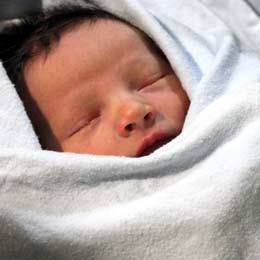Why get your child vaccinated?
Rotavirus is a virus that spreads easily among infants and young children. The virus can cause severe watery diarrhea, vomiting, fever, and abdominal pain. Children who get rotavirus disease can become dehydrated and may need to be hospitalized.
Before rotavirus vaccine, rotavirus disease was a common and serious health problem for children in the United States. Almost all children in the United States had at least one rotavirus infection before their 5th birthday.
Infants and young children are most likely to get rotavirus disease. They can become severely dehydrated and need to be hospitalized and can even die.
When should your child get the Rotavirus vaccine?
Two brands of rotavirus vaccine are available. Your baby will get either 2 or 3 doses, depending on which vaccine is used.
Doses are recommended at these ages:
- First Dose: 2 months of age
- Second Dose: 4 months of age
- Third Dose: 6 months of age (if needed)
Your child must get the first dose of rotavirus vaccine before 15 weeks of age, and the last by age 8 months.
The Rotavirus vaccine may safely be given at the same time as other vaccines.
Medications
Well-Child Checkups
Other Routine Immunizations We Provide
-
Diphtheria, Tetanus, and Pertussis (DTaP)
Diphtheria, tetanus, and pertussis are serious diseases caused by bacteria. Diphtheria and pertussis are spread from person to person. Tetanus enters the body through cuts or wounds.
-
Hepatitis A
Hepatitis A is a serious liver disease caused by the hepatitis A virus (HAV). HAV is spread from person to person through contact with the feces (stool) of people who are infected, which can easily happen if someone does not wash his or her hands properly.
-
Hepatitis B
Hepatitis B is a serious disease that affects the liver. It is caused by the hepatitis B virus. Hepatitis B can cause mild illness lasting a few weeks, or it can lead to a serious, lifelong illness.
-
Hib (Haemophilus Influenzae Type B)
Haemophilus influenzae type b (Hib) disease is a serious disease caused by bacteria. It usually affects children under 5 years old. It can also affect adults with certain medical conditions.
-
HPV
HPV vaccine prevents infection with human papillomavirus (HPV) types that are associated with many cancers.
-
Influenza - Inactivated
Influenza or “flu” is a contagious disease that spreads around the United States every year, usually between October and May.
-
Measles, Mumps, Rubella (MMR)
Measles, Mumps, Rubella, and Varicella (chickenpox) can be serious diseases. These diseases can spread from person to person through the air. Varicella can also be spread through contact with fluid from chickenpox blisters.
-
Measles, Mumps, Rubella & Varicella (MMRV)
Measles, Mumps, Rubella, and Varicella (chickenpox) can be serious diseases. These diseases can spread from person to person through the air. Varicella can also be spread through contact with fluid from chickenpox blisters.
-
Meningococcal Conjugate Vaccines (MCV)
Meningococcal disease is a serious illness caused by a type of bacteria called Neisseria meningitidis. It can lead to meningitis (infection of the lining of the brain and spinal cord) and infections of the blood.
-
Serogroup B Meningococcal (MenB)
Meningococcal disease is a serious illness caused by a type of bacteria called Neisseria meningitidis. It can lead to meningitis (infection of the lining of the brain and spinal cord) and infections of the blood.
-
Pneumococcal Conjugate (PCV13)
Pneumococcal disease is caused by bacteria that can spread from person to person through close contact. It can cause ear infections, and it can also lead to more serious infections .
-
Polio
Polio is a disease caused by a virus. It is spread mainly by person-to-person contact. It can also be spread by consuming food or drinks that are contaminated with the feces of an infected person.
-
Rotavirus
Rotavirus is a virus that causes diarrhea, mostly in babies and young children. The diarrhea can be severe, and lead to dehydration.
-
Tdap (Tetanus, Diphtheria, Pertussis)
Tetanus, diphtheria, and pertussis are very serious diseases. Tdap vaccine given to pregnant women can protect newborn babies against pertussis.
-
Varicella (Chickenpox)
Chickenpox (also called varicella) is a common childhood disease. It is usually mild, but it can be serious, especially in young infants and adults.
Immunization Schedules from the CDC
Easy-to-read formats to print, tools to download, and ways to prepare for your office visit.




















